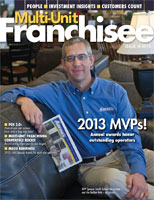Are You Building for Success or Failure?
90 percent of SMBs fail from poor financial management
You say you want to own a business and make your own decisions? You say that owning a business is one of the few remaining ways to build net worth today? You say that building a business is one of the greatest personal challenges you can face? That success makes the clearest possible statement about your perseverance, ingenuity, and skill?
Well, ladies and gentlemen, you're right. And you're right no matter how you became an independent business owner. You probably didn't volunteer for the job. Perhaps you married into it, or inherited it, or got fired from another job and just fell into it. No matter. There it was, and you did it.
It wasn't easy, either. I know. In more than a decade of working with business owners, I've learned to recognize the type. You come home after a normal 16-hour day and sit at the dining room table complaining bitterly about cutthroat competition, the over-reaching government, thieving employees, and the lousy unions. Then you look across the table at your 15-year-old child and say, "Kid, some day all of this will be yours!"
What makes you tick? For starters, you probably have a technical skill: you know how to do something well, and you're prepared to work long hours to succeed. Why? Maybe to show the so-and-so who said it couldn't be done that it could. But more probably, it's because you want freedom, power, and the last word--or perhaps, opportunity, something uniquely available in this nation of ours. Reasons involve dreams, too: dreams for a path to a better tomorrow.
These, perhaps, represent a few of the components in the fabric that binds us in common--all of which makes you a card-carrying member of this country's traditional small business community, founded on the principles of opportunity and upward mobility. The innate attraction was the chance to get ahead on your own merits. And despite the socioeconomic changes that have transformed this nation since its earlier days--the machine age, the industrial revolution, and ever-accelerating technological advances and growth--the small business tradition has tenaciously survived. More than that, and in the face of sometimes monumental obstacles, it has even prospered.
Of the 26 million businesses in the United States, the vast majority are small enterprises, closely held or family managed. The small business sector employs roughly 50 percent of the non-government workforce, making it easy to imagine our economic plight without the support of small business. Statisticians will tell you that 600,000 new businesses are started each year in the U.S. They'll also tell you that an almost equal number fail, some 50 percent in the first three years.
From bittersweet statistics such as these, you can draw two conclusions: first, the lure of independent ownership is as strong as ever; and second, the laws of natural selection and survival of the fittest operate here with staggering efficiency.
To know what it takes to survive as a small-business owner, you must look at why businesses fail. While the excuses offered are many, the real reasons actually are few. Usually, when you see two partners involved in a business enterprise, one knows how to make it and one knows how to sell it. Unfortunately, neither knows much about financial management. Let the record show that 90 percent of small business failures are the result of poor financial management.
Where financial management is concerned, some otherwise intelligent, hard-working, and creative business owners are exactly like the automobile owner we used to see on the old Fram Oil Filter TV commercial. His car needs repairs, but he doesn't want to bother with them now. Of course, the longer he puts them off, the more serious they'll become, and the more they'll cost. As the TV salesman warns, "You can pay me now or pay me later."
The business owner who ignores his company's financial picture runs the same kind of risk. Only instead of a ruined car, he's looking at a dead business, which means his own and his family's livelihood. The telltale signs are clear enough. He leaves the company's financial analysis to his banker and accountant and, if there is no red ink in their reports, he breathes a sigh of relief and tosses them into the third drawer, lefthand side, along with all the others gathering dust there.
Why, then, does this frequently fatal ignoring of financial management occur as often as it does? It's psychological, mostly. We are all human, and it's human nature to focus on what we do well and try to ignore what we don't. Also, there's a deep-seated suspicion that this whole finance business is a bunch of hocus-pocus malarkey, secretly controlled by pompous, bespectacled charlatans in three-piece suits whose chief task in life is to give us migraines and send us big bills.
This suspicion is largely unfounded, but it does raise an interesting question. As a parent, would you leave the raising of your children to a daycare center? Obviously not. Why then, as a business owner, would you want to leave the health and care of your company, which you also view as a living, breathing entity, in the hands of strangers?
It is precisely in this area of financial management--thus the growth and health of your business--that you may ignore your responsibility as owner. While you are your company's greatest asset, you can also become one of its primary liabilities. Sound financial planning and control will not, by itself, make you a successful owner. However, it will often keep you in business long enough for your technical expertise to create success and achieve your dream. Without it, you don't know where you've been, or where you're going. In that case, any road (or no road) will get you there. With it, you have a fundamental guide to follow in planning and charting a course for your company.
Steve LeFever is the founder and chairman of Profit Mastery, a Seattle-based eLearning company that has trained more than half a million people worldwide on how to measure and manage financial information to consistently increase business profits. Their educational programs are available online as an on-demand video program 24/7/365. Learn more at www.profitmastery.net. or contact him at 800-488-3520 x14 or [email protected].
Share this Feature
Recommended Reading:
FRANCHISE TOPICS
- Multi-Unit Franchising
- Get Started in Franchising
- Franchise Growth
- Franchise Operations
- Open New Units
- Franchise Leadership
- Franchise Marketing
- Technology
- Franchise Law
- Franchise Awards
- Franchise Rankings
- Franchise Trends
- Franchise Development
- Featured Franchise Stories
FEATURED IN

Multi-Unit Franchisee Magazine: Issue 3, 2013

$50,000
$100,000





 The multi-unit franchise opportunities listed above are not related to or endorsed by Multi-Unit Franchisee or Franchise Update Media Group. We are not engaged in, supporting, or endorsing any specific franchise, business opportunity, company or individual. No statement in this site is to be construed as a recommendation. We encourage prospective franchise buyers to perform extensive due diligence when considering a franchise opportunity.
The multi-unit franchise opportunities listed above are not related to or endorsed by Multi-Unit Franchisee or Franchise Update Media Group. We are not engaged in, supporting, or endorsing any specific franchise, business opportunity, company or individual. No statement in this site is to be construed as a recommendation. We encourage prospective franchise buyers to perform extensive due diligence when considering a franchise opportunity.